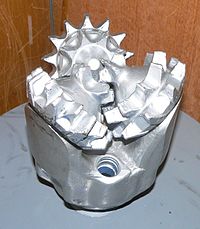
Photo from wikipedia
Abstract Wellbore instability in shallow unconsolidated formations is a great challenge to deepwater oil and gas drilling operations. Traditional experimental methods for evaluating wellbore stability cannot effectively simulate the cementation… Click to show full abstract
Abstract Wellbore instability in shallow unconsolidated formations is a great challenge to deepwater oil and gas drilling operations. Traditional experimental methods for evaluating wellbore stability cannot effectively simulate the cementation and consolidation effects of the drilling fluid on unconsolidated formations. To overcome this problem, this paper proposes an experimental device and method for evaluating the effect of drilling fluids on wellbore stability in deepwater shallow unconsolidated formations. The effects of some typical drilling fluid wellbore stabilizers on wellbore stability in such formations were examined using the needle penetration, permeability, and compressive strength as the evaluation indexes. The results exhibited favorable repeatability with the proposed method. The deepwater formation was simulated by using quartz sand with a particle size range of 450 μm–300 μm (40–60 mesh) and a sand-to-clay ratio of 7:3. The compressive strength and needle penetration of the rock sample cannot be effectively improved with conventional shale inhibitors such as KCl and polyamine, as they are unable to cement and consolidate the wellbore. By contrast, the use of silicates and aluminum complex can effectively reduce the needle penetration and permeability of the rock sample, and can simultaneously enhance its compressive strength by approximately 18%, thus significantly enhancing wellbore stability in unconsolidated formations in deep water. When encountering formation water with a low pH value and Mg2+/Ca2+ ions in the formation, aluminum complex can produce Al(OH)3 and humic acid precipitates, which can cement the wellbore and enhance the compactness of the filter cake, thus improving wellbore stability.
Journal Title: Journal of Petroleum Science and Engineering
Year Published: 2019
Link to full text (if available)
Share on Social Media: Sign Up to like & get
recommendations!